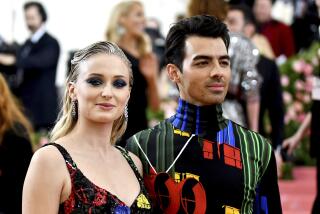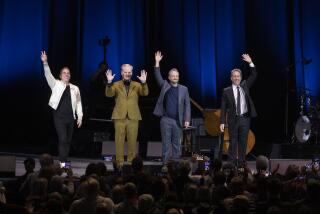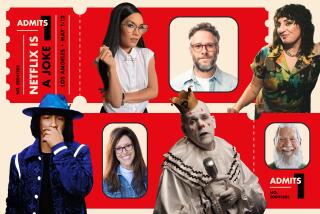Demi Lovato and Nick Jonas on their joint summer tour: ‘This isn’t just a fiddly-diddly concert’
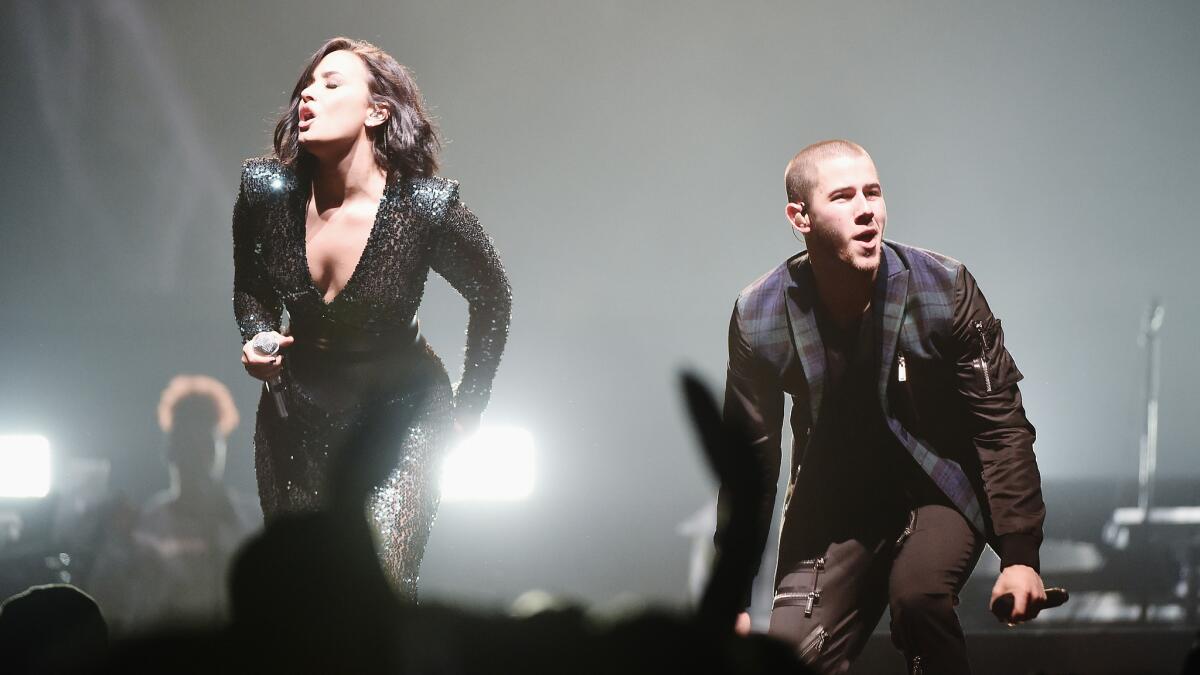
Reporting from Boston — Eight years ago, few might have predicted that the fresh-faced stars of the hit Disney Channel musical “Camp Rock” would go on to freely discuss sex in their work, become outspoken proponents for the LGBT community and, this year, mount a joint tour inspired by Bruce Springsteen.
But the Boss is just who Nick Jonas said he and Demi Lovato had in mind when they conceived their relatively stripped-down road show, “Future Now,” which launched in June and will stop Wednesday at Anaheim’s Honda Center before returning to Southern California for a Sept. 17 finale at the Forum in Inglewood.
Specifically, Jonas explained, it was Springsteen’s run of concerts last spring at the Los Angeles Sports Arena — along with a Billy Joel gig he caught at New York’s Madison Square Garden — that made this former tween idol want to turn away from the pop pageantry with which he’d made his name as part of the Jonas Brothers.
“I left that Springsteen show and was like, ‘We’ve got to think like this,’” he said, sprawled on a couch next to Lovato in a dressing room before a recent date at Boston’s TD Garden.
“Just to go onstage, no theatrics, and pour your heart and soul into the music — that’s what we wanted,” Lovato added as her small black dog scampered around her legs.
In truth, the “Future Now” tour isn’t exactly a no-frills jam-a-thon.
In Boston, the two performers, both 23, were accompanied by sleek visuals and wore outfits considerably more involved than Springsteen’s faded dad jeans.

And the songs, of course, were flashy in their own way: stomping electro-pop tunes like Lovato’s “Confident,” moist R&B come-ons like Jonas’ “Chains” and souvenirs of sexual experimentation like the controversial “Cool for the Summer,” in which Lovato details an encounter with another woman.
But if it’s true, as Jonas said in a freewheeling conversation, that the pop world “is pretty oversaturated these days” — packed with high-tech arena spectacles from Beyoncé, Justin Bieber and Madonna — then this production, with its emphasis on live vocals backed by a muscular band, does feel like a different animal. These are excerpts from our talk.
How often do you think about “Camp Rock”?
Demi Lovato: I don’t, to be honest, unless somebody brings it up.
So what’s coming to mind now?
Nick Jonas: Schooling. We were both 14 or 15 when we filmed the movie, so they had a teacher on set, and you had to do a certain amount of school each day: four hours of school, six hours of work. By the second [“Camp Rock” movie], Demi and I had both had tested out of high school in California, so we were riding high, enjoying life.
Does a kid in show business learn anything from an on-set tutor?
Jonas: From some of them, no. But there was this girl Laura, who actually really helped me prep for the test, because I was not prepared.
Shout out to Laura.
Jonas: Laura Erikson. She was great.
Lovato: Mine was Marsha. But other than that? Some were literally just like, “I can’t help you with anything — let’s watch a movie and say you did some studying.”
Talk about moving out of the kiddie phase of your career. Is it a transition you have to manage carefully?
Lovato: I kind of cheated — I went to rehab.
Express route.
Lovato: A real FastPass. But even after that, I had to transition. For me, it was: How do I evolve with my fans? Once I turned 19, I played a lesbian on “Glee.” But I didn’t necessarily go to “Glee” and say, “I want to play a lesbian because I think it’ll be a departure.” It was just a really cool role. Or cursing in your songs — it’s what you’re saying in real life, so why wouldn’t you do it in a song?
Jonas: I think we had two very different journeys. I was in my transition from adolescence to adulthood while also trying to manage being a family and having our business kind of fall apart. So I made a conscious effort to push myself and collaborate with different people. The word “intentional” is dangerous, but it was about intentionally doing certain photo shoots and things that would give people a better idea of who I am today as opposed to their first introduction when I was 14.
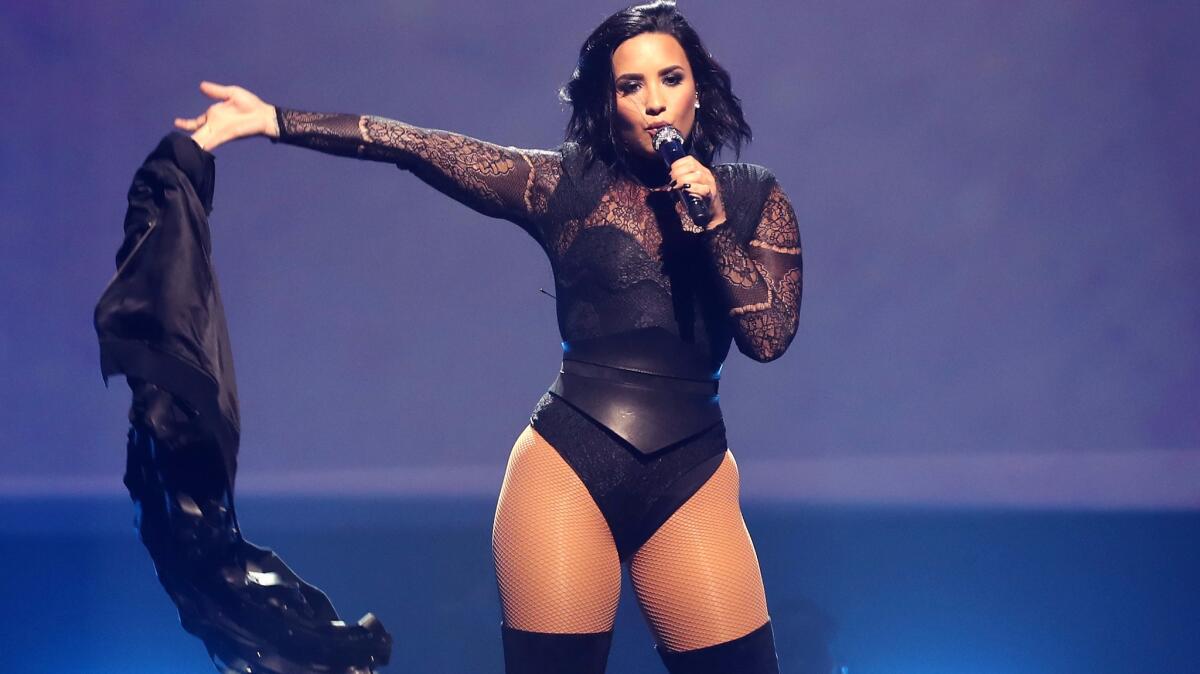
::
As individualized as their journeys have been, one thing that’s united the two singers is the way they’ve handled sex in their work — which is to say, the enthusiasm with which they’ve handled it.
A certain amount of lustiness is crucial for any former kiddie star looking to leave the past behind; it’s part of the script followed by Britney Spears, Justin Timberlake, Miley Cyrus and plenty of others.
Still, Jonas and Lovato have gone further than most, in songs like his comically lewd “Bacon” and in revealing photo shoots like the one Lovato did last year for Vanity Fair that had her naked in a hotel bathtub.
Yet it’s not mere titillation or shock value that they appear interested in but something deeper, something almost philosophical about the nature of desire — and of being desired.
Lovato: You might change your mind when you see my outfit tonight: I basically come out in a thong.
But even that seems like part of this overall quest for freedom.
Lovato: It’s definitely liberating. I mean, for someone who’s had body image issues to be able to go onstage in a thong — it’s not just me trying to be sexy. It’s: “Look how far I’ve come — I can now show off my whole body and be confident.”
Jonas: As a songwriter, the minute you start having sex, you can totally see the difference in the writing. You become an adult — that’s kind of the whole backbone of it, really, your identity as a person and what sex means to you.
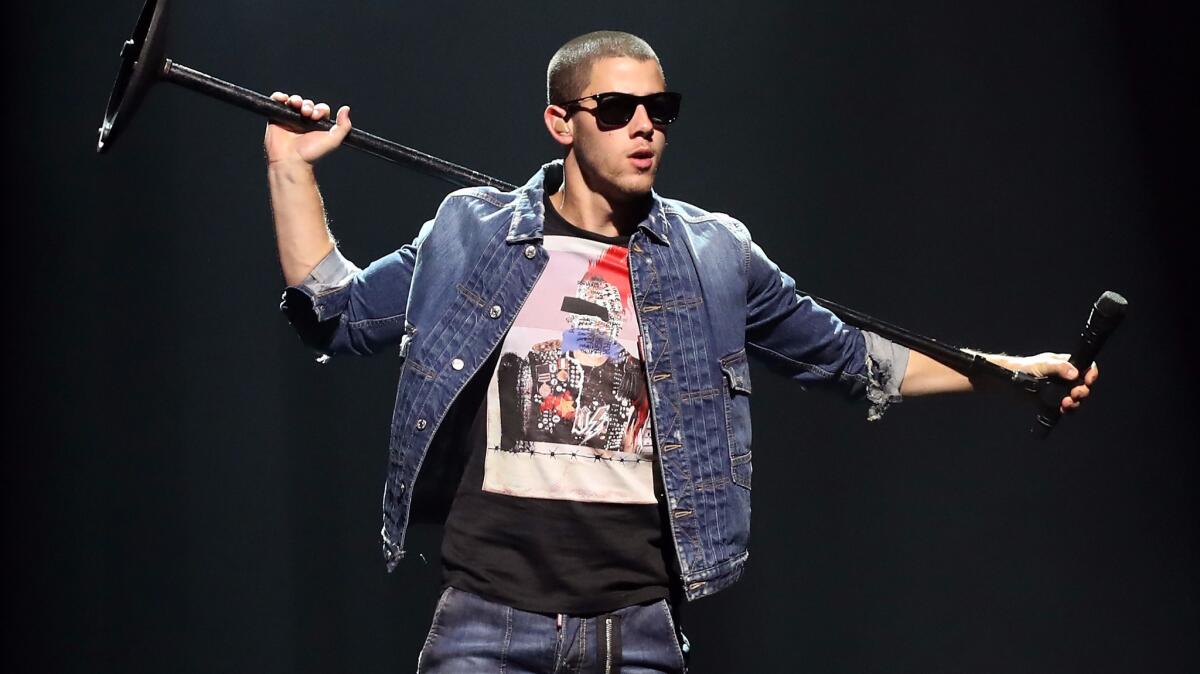
Because you both approach sex candidly, you know the experience of being ogled. The idea of your body becomes public property in a way.
Lovato: I look at it as I’m sharing my experience with my body with my fans, and that’s why they relate to me so much.
Does that encourage people to expect certain details and images from you?
Lovato: There’s an expectation today because of the access to celebrity that this generation has. When I was dreaming about becoming an artist, there weren’t camera phones; now people get offended if you say no to a picture. The reaction people have when a celebrity enters a room, it blows my mind.
Even though you’re the one disrupting the atmosphere?
Lovato: It blows my mind more so. Why am I disrupting the atmosphere? I’m just a person.
Do you think about the effect a specific act might have? “If I post X on Instagram, then Y will happen.”
Jonas: Of course. When I was younger, that used to really shake me. I was kind of living in fear.
Fear of what?
Jonas: Disappointing people. I didn’t ask to become a role model, but it was thrust upon all of us, regardless of whether you acknowledge it. You have to come to a decision as an adult and say, “I’ve got to live my life.” There’s nothing wrong with thinking ahead and being aware of how it might affect somebody — everything from a post to where you have dinner to who you’re with. But these aren’t things you can let consume your life.
You’ve both been outspoken about gay rights.
Lovato: I think the answer is: Why not? I grew up in the South where there’s discrimination, and when I witnessed the judgment around me, I always thought someone needs to stick up for not just the LGBT community but any outsider, anybody that wasn’t the mold in Texas.
You had to have known “Cool for the Summer” would elicit a reaction.
Lovato: I had an experience that I wanted to write about. There was no X-Y about it other than, “OK, I’m finally singing about sex.” But it really was just coming from wanting to be more honest with my music, and also maybe giving more insight into why I’m so passionate about the LGBT community.
Nick, you play a gay MMA fighter on the TV show “Kingdom.”
Jonas: It’s a tough story to tell, and I think there’s a responsibility as someone representing the LGBT community to do what I can to show support.
Is it tricky to represent that community from outside?
Jonas: As a heterosexual male, I’ve gotten some criticism. But you’ve got to block out the noise to hear the change.
::
Like most pop stars their age, Jonas and Lovato make music that pulls from any number of styles.
But something else they share is a determination to do a given genre with real credibility, to inhabit the style instead of merely gesturing at it the way some of their peers might.
You could see that at KIIS-FM’s annual Jingle Ball concert in 2014, where Jonas sang his song “Jealous” with help from a full gospel choir whose members seemed truly impressed by the skinny boy-band survivor who’d brought them onstage.
The same went for Lovato at this year’s Grammy Awards, which included a multi-artist tribute to Lionel Richie. For her part, Lovato sang — well, demolished — “Hello,” and there was a great reaction shot from Richie that made clear how taken he was by her performance.
Jonas: That was my proudest moment as her friend. The reaction from Lionel was great, people affirming her in the business. But was what really awesome is that she solidified herself as one of the best vocalists in the game.
And yet that’s not why thousands of people came to see you tonight.
Lovato: A lot of the people here tonight just want to see their favorite artist in person. It’s the celebrity they’re focusing on. And I think a lot of people in the industry can get caught up in that, not wanting to be credible so much as just wanting to be famous. The difference with our concert is that when we go out there, we don’t have backup dancers. There’s no lip-syncing; there’s no tracks blaring.
Jonas: Demi and I had a conversation where we said, “We have to make this the opposite of every pop show we’ve seen in the last 10 years.”
Lovato: We wanted to show everyone we can carry a concert with just us.
Why was that important?
Lovato: It’s longevity; it’s respect. And it’s showing respect to the audience by saying, “This isn’t just a fiddly-diddly concert. We’re playing music, and we want you to feel it — every bit of it.”
Twitter: @mikaelwood
ALSO
Rae Sremmurd answers its critics on the thoughtful ‘SremmLife 2’
Adele’s flair for intimacy on a grand scale shines at first Staples Center show
‘All my homies showed up tonight?’: Gwen Stefani opens her summer tour on a high note
More to Read
The biggest entertainment stories
Get our big stories about Hollywood, film, television, music, arts, culture and more right in your inbox as soon as they publish.
You may occasionally receive promotional content from the Los Angeles Times.
